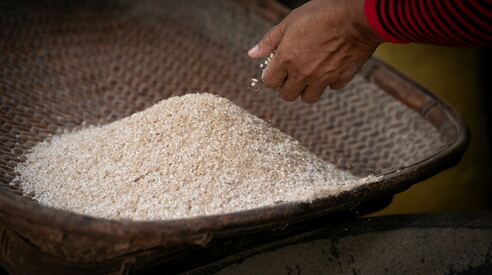What does food have to do with the rise of the far right, even in Japan?


Photo by Helena Pfisterer on Unsplash
the consequences of rising prices
High rice prices are causing governments to falter: in Japan, record prices contributed to the government's electoral defeat. Similar crises have already occurred in India, the Philippines, the United States, and even Russia, where food prices are becoming a central political issue.
On the same topic:
After onions and eggs, now it's rice's turn. In Japan, high prices have contributed to the government losing its majority in the upper house . In India, the term "onionomics" was coined years ago: a veritable "onion economy," where the price of the vegetable can decide the fate of a government, much as happens with the price of gasoline in our country. A similar alarm was then raised in the Philippines, and in the United States, the rising price of eggs was even cited as one of the reasons for Trump's return. In reality, prices have remained high since then, and under the new president, record increases have also been recorded for honey and meat—and the tariffs Trump continues to threaten against the rest of the world have yet to take effect. Yet the tycoon continues to exploit the issue, saying he will take action against California because—in his opinion—local regulations protecting chickens are what make omelettes a luxury throughout the United States. In 2023, even Putin made the completely unprecedented gesture of apologizing live on TV for a 46.2 percent increase in the price of eggs, during a session where citizens can ask the president questions.
Nothing new under the sun, really. The French Revolution was sparked in part by the infamous phrase attributed to Marie Antoinette: "If they have no bread, let them eat brioche." A similar statement came from Betsy Díaz Velázquez, Cuba's Minister of Domestic Trade, who told deputies that Cuba doesn't lack food: citizens should just consume more "banana croquettes and fish broth." Kim Jong-il also attributed the famine in North Korea to the population's continued demand for rice instead of potatoes. Today in Japan, Agriculture Minister Taku Eto was forced to resign after he stated during a fundraising event in Saga Prefecture: "I haven't bought rice in a while because my supporters give me so much of it, I could almost start selling it." The tone was intended as a joke, but the opposition threatened a motion of no confidence, and his attempt to correct the situation by explaining that he was referring to the brown rice he had received as a gift, while he continued to buy white rice for his family, only made the situation worse. In a year, the price of East Asia's iconic grain has more than doubled, amid poor harvests, inflation, and a boom in demand linked in part to the recovery of tourism. Naturally, his replacement, Shinjiro Koizumi, immediately declared himself the "de facto rice minister." To lower prices, he put up for sale a large portion of the government's reserves set aside for emergencies, delivering them directly to supermarkets to cut out the middlemen. Thus, the price did indeed drop, but not by much: from about 4,100 to 3,500 yen for 5 kilos, equal to about 20 euros. A quarter more than an average package in Italy. And while it's true that the Japanese diet has diversified—since 2011, bread consumption has surpassed rice—the cereal remains a symbolic food.
Discontent over the high price of rice also played a role in Sunday's election defeat. The governing coalition, made up of the Liberal Democratic Party (which fell from 119 to 101 seats) and the Buddhist Komeito Party (from 27 to 21), stalled at 122 of the 248 seats. It had already lost its majority in the Lower House last October. Founded in 1955, the Liberal Democratic Party has governed Japan for 66 of the last 70 years, with the sole exceptions of 1993-94 and 2009-2012. But this is the first time it has found itself in government without a majority in either the House or the Senate. It is holding on only because the opposition is more divided than ever. The center-left Constitutional Democratic Party (CDP) dropped from 39 to 38 seats, while the center-right Democratic Party for the People (DP) rose from 10 to 22. The ultra-liberal Ishin Party (IDP) dropped from 21 to 19, but the most surprising thing was the boom in the far-right Sanseito party. Considered xenophobic, misogynistic, and conspiracy-theorist, founded in 2020 by the anti-vaxxer and anti-Semite Sohei Kamiya, it rose from one to 15 seats.
More on these topics:
ilmanifesto





